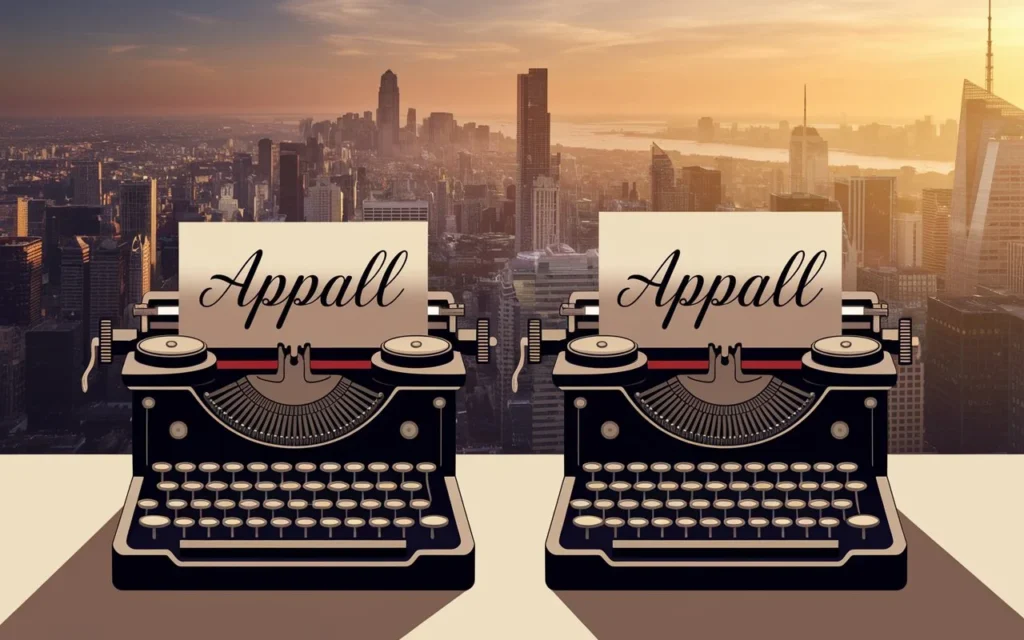Are you often left wondering whether to use appall or appal in your writing? You’re not alone. These two words sound so similar and share the same meaning, but their differences go beyond pronunciation. If you’re looking to refine your writing skills, especially when it comes to distinguishing between British and American English, understanding the subtle difference between appall and appal can make your communication clearer, more precise, and much more professional.
At first glance, appall and appal seem interchangeable. After all, both words describe the strong emotional reaction of shock, horror, or disgust. However, there are key distinctions in their regional usage and spelling conventions that can affect the clarity and authenticity of your writing. Understanding these differences is crucial, especially if you’re writing for an international audience.
This article will demystify the difference between these two words, explaining their etymology, regional variations, correct usage, and offering practical tips to ensure you’re using them correctly in your writing. Let’s dive into the details!
I. What Does “Appall” Mean?
Definition of Appall
Appall is a verb that means to shock, horrify, or disgust someone deeply. When something appalls you, it causes you to react with strong dismay or a sense of horror. The emotion tied to appalling experiences or events is intense enough to leave you shaken or disturbed.
You can think of appall as referring to situations that go beyond mere disappointment. For example, witnessing a horrific crime or learning about a major scandal might appall you.
Etymology and Origins
The word appall traces back to the Old French word apalir, which means to become pale. It originally referred to a person turning pale due to fear or shock. Over time, it evolved to describe the emotional impact of a shocking or horrifying event, which is what we know today as appalling.
Examples of Appall in Sentences
- The sight of the devastated neighborhood after the flood appalled the rescue teams.
- I was appalled by the blatant disrespect shown by the speaker during the debate.
- The appalling conditions in the refugee camps shocked the international aid workers.
As you can see, appall describes intense emotional reactions, often involving a sense of deep discomfort, outrage, or disbelief.
II. What Does “Appal” Mean?
Definition of Appal
Appal is simply a variant of appall—it carries the exact same meaning. The key difference between the two is that appal is chiefly used in British English, while appall is preferred in American English. In other words, appal is the British spelling, while appall is the more common form in the U.S. and other parts of the world that follow American English conventions.
Examples of Appal in Sentences
- The extreme poverty in the region appalled the visiting diplomats.
- It appals me how some people continue to ignore the reality of climate change.
Despite the difference in spelling, the meaning is exactly the same. Both words convey a sense of disgust, horror, or shock at something that is morally or emotionally unsettling.
Key Differences Between “Appall” and “Appal”
Regional Usage
The primary distinction between appall and appal comes down to regional preferences in English.
- American English: In the U.S., the standard and most commonly used form is appall. It’s the preferred spelling in everything from news outlets and academic writing to informal communications.
- British English: In the UK and some other Commonwealth nations, appal is used instead of appall. Although appall is recognized and understood, appal remains the more frequent spelling.
Examples of Regional Usage
- In the U.S.: The politician’s behavior appalled the crowd.
- In the UK: The politician’s behavior appalled the crowd, or The politician’s behavior appalled the crowd (with a British spelling).
In the context of modern writing, appall tends to be used more widely in both formal and informal writing across all regions, though appal still maintains its place in British texts.
Cultural Considerations
- When writing for a British audience, using appal aligns with the local spelling conventions, making your content feel more natural to that specific demographic.
- For international readers, using appall may be safer to ensure clarity, as it is the more universal spelling used across both formal and informal settings.
The Pronunciation of Appall and Appal
Interestingly, pronunciation does not vary between appall and appal. Both words are pronounced the same way: /əˈpɔːl/ (uh-PAWL). This means there’s no need to worry about which pronunciation to use when speaking. The only distinction lies in the spelling and the regional usage.
The Historical Roots and Evolution of Appall and Appal
Both appall and appal share the same historical origins. As mentioned earlier, they come from the Old French apalir, which means “to pale.” In early usage, the word referred to the paleness of someone who was struck with fear or shock. Over time, this word evolved to describe the emotional reaction of horror or disgust caused by shocking events.
Why the Spelling Difference?
The divergence between appall and appal can be traced back to the development of British and American English. As the two versions of English evolved in different regions, so did their spelling rules. British English, which tends to preserve older spelling traditions, kept appal as the preferred form, while American English streamlined and simplified spelling, leading to the widespread use of appall.
When to Use Appall and Appal in Writing
A. Writing for an American Audience
- If you’re writing for an American audience, appall should be your go-to word. It’s widely accepted and will avoid confusion.
- Common usage: appalling conditions, appalling behavior, appalling news.
B. Writing for a British Audience
- For British English, appal is the norm. If you’re writing for a British audience or in a formal British context, you’ll want to stick with this spelling.
- Common usage: appalling treatment, appalling ignorance, it appals me.
C. For International Writing
- In most cases, choose appall for international audiences. It’s widely understood and recognized across various English-speaking countries, whether they follow American or British norms.
Grammar and Tense Variations
Both appall and appal follow the same grammar rules. Their conjugation remains identical, regardless of the spelling.
| Tense | American English | British English |
| Present | appall(s) | appal(s) |
| Past | appalled | appalled |
| Present Participle | appalling | appalling |
Both versions of the verb are regular verbs, meaning their past tense and participle forms are appalled, and their present participle is appalling.
Common Mistakes to Avoid
1. Mixing the Two Words
Avoid mixing appall and appal in the same piece of writing unless you’re explicitly quoting or using both forms for contrast. Consistency is key when it comes to regional spelling conventions.
2. Using Both Spelling Variants in One Document
If you’re writing for a specific region, stick to the regional spelling throughout your document. Don’t switch between appall and appal, as this can confuse the reader and make your writing seem inconsistent.
3. Overusing “Appal” in American English
While appal is grammatically correct, it’s not commonly used in American English. Using it in American contexts can seem outdated or overly formal. Stick with appall unless you’re writing for an audience that prefers British English.
How to Remember the Right Form
Memory Tricks for American English Writers
Think of appall as the word that “calls” out your reaction to something shocking or horrifying, just like how the word “recall” has the double “L” in it. The more familiar you are with the spelling appall, the easier it becomes to use consistently.
Memory Tricks for British English Writers
If you’re writing in British English, remember that appal is often the more traditional spelling. Think of it as having the older, more “classic” feel in contrast to the more modern American variant.
Final Thoughts: Appall or Appal – Which One Should You Use?
When it comes to choosing between appall and appal, the choice depends largely on where your audience is and which version of English you’re writing in. Appall is the correct form for American English, while appal is the preferred spelling in British English. However, both words carry the same meaning, so there’s no need to worry about any difference in semantic impact.
Always double-check your audience, platform, and context before choosing your spelling, and your writing will be more effective, clearer, and more professional.




